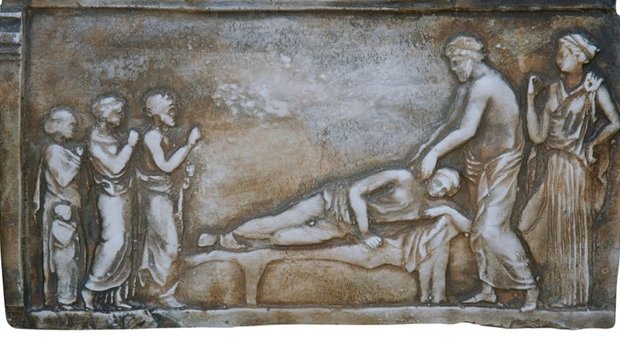Interdepartmental Research Center on Ancient Medicin (RIMA)
Research
RESEARCH CENTERS
Interdepartmental Research Center on Ancient Medicin (RIMA)
Scientific Director: Prof. Daniele Morandi Bonacossi
Venue: Palazzo Caiselli, second floor, room L2-14
Telephone: +39 0432 556643
Email: rima@uniud.it
The Intedepartmental Research Center on Ancient Medicine (RIMA) was established on 26th May 2017, under Article 17 of the General Regulation of the University and with resolution of the University Council. It represents an autonomous scientific structure that involves the Department of Humanities and Cultural Heritage (DIUM), the Department of Medicine (DAME) and the Department of Agrifood, Environmental and Animal sciences (DI4A); it is based though at DIUM, which is also in charge of its administrative and accounting management.
RESEARCH AREA
The research area of RIMA covers the following themes, which are often interconnected:
- Diseases and geographical environment: environmental and hygienic conditions as cause of diseases, nutrition and diet, longevity and mortality;
- Socio-cultural context: social role of the health specialists, society's attitude towards health, disease, mortality etc.;
- Education and training of the health specialists: text-books, medical schools, healing centers, pharmacies and the like; differences among the figures of the medical specialists; relations between medical practice and religious beliefs and/or ritual practices;
- Symptomatology and medical diagnosis: medical examinations, anamnesis, symptoms detecting, identification of the physical cause, diagnosis of remission or death; use and application of medical treatments, specific healing techniques, extra-medical elements (rituals, exorcisms, spells etc.);
- Surgery: tools, cases and limits of the intervention; internal anatomical knowledge regarding animals and humans; treatment of fractures, wounds, abscesses, infections; ophtalmology and dentistry; obstetrics;
- Diagnostic systems: their (diachronic and synchronic) evolution from religion to science; exchanges of specialists and experiences between different geographical and cultural areas;
- Identification of the origin of the diseases: from the theories that looked for them in external factors (e.g. the pre-hyppocratic greek medicine) to the hyppocratic theory of the "humors";
- Taxonomic and molecular identification and study of the plants employed in ancient Pharmacopoeia;
- Identification and evolutionary study of pathogenic microorganisms based on their DNA analysis;
- Study methodologies of ancient medicine: traditional approach and historicism, historical-anthropological approach, problems relating to technical terminology and interpretation, use and limits of the "retrospective diagnosis".
OBJECTIVES
The objectives of the Center shall be:
- to promote, conduct and coordinate research activities, by taking advantage of various specialists: Philologists and experts in ancient literatures and religions, Cultural Anthropologists, Paleoanthropologists, Archaeologists, Ancient Historians and Historians of Medicine, Paleobiologists and experts in Applied Genomics, IT and Digital Humanities specialists.
- to promote through publications, conventions, seminars and exhibitions, the dissemination of research in the field of ancient medicine through a historical, archaeological, archaeomedical and archaeobiological perspective. In particular, the scientific activity of the Center will focus especially on:
- the publications of volumes dedicated to yet unpublished parts of the Mesopotamic medical corpus, as well as of other linguistic and cultural provenance, and of scientific comparative studies on various connected aspects of the Ancient World;
- the organization of international conventions and workshops;
- the constant participation of its members to the major international conferences and conventions dedicated to the subject;
- to communicate effectively the results of the research activities promoted by the Center;
- to offer support for research in diverse scientific sectors, by providing equipment and expertise;
- to collaborate with national and international institutions operating in the sphere of ancient medicine;
- to offer consulancy and research activities to bodies and institutions interested in the themes investigated by RIMA;
- to promote, support and organize didactic activities like master classes, formation courses, specialisations, doctorates. RIMA could also organize educational activities for graduating students in disciplines like Archaeology, Ancient History and History of Medicine, as well as for the general public





